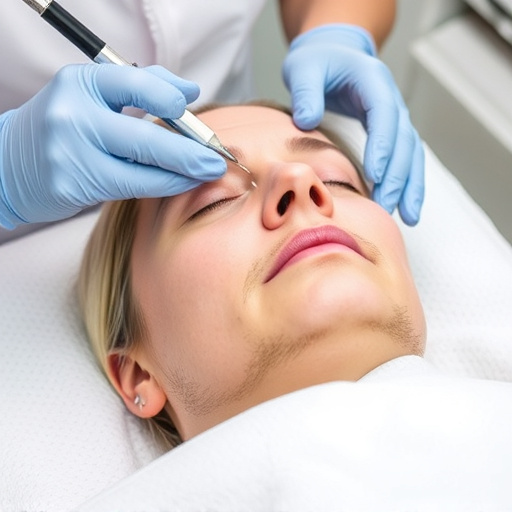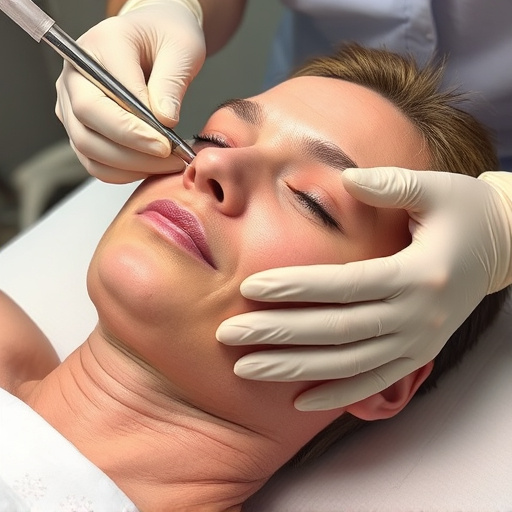Melasma, often misunderstood as pregnancy-related, is a skin condition with effective treatments beyond topical creams. Personalized medical spa services, procedures like microdermabrasion and chemical peels, along with tailored acne therapies, offer solutions. Consulting professionals for personalized advice is crucial to managing melasma, addressing hormonal and genetic factors contributing to the condition.
“Unraveling the mysteries of melasma treatment, we expose common myths that cloud effective care. Many turn to the internet for answers, encountering a labyrinthine web of misinformation. This article serves as your guide through the haze, separating fact from fiction in melasma management. We delve into proven strategies, offering insights beyond popular misconceptions. By understanding the truth about melasma treatment, you can make informed decisions and embrace a clear, confident skin journey.”
- Debunking Common Melasma Treatment Misconceptions
- Separating Fact from Fiction in Melasma Care
- Effective Strategies Beyond Popular Myths
Debunking Common Melasma Treatment Misconceptions

Melasma, often referred to as ‘mask of pregnancy,’ is a common skin condition characterized by dark patches on the face. Despite various melasma treatment myths circulating, understanding facts about this condition is essential. One of the most prevalent misconceptions is that it can’t be treated or only requires topical creams. While hydrocortisone and certain retinoids can help fade spots, these are just part of the solution.
Many turn to medical spa services, recognizing their effectiveness in addressing melasma. Customized facials, for instance, offer a targeted approach by exfoliating the skin, reducing hyperpigmentation, and enhancing its overall texture. Additionally, non-surgical treatments like microdermabrasion or chemical peels can profoundly improve the appearance of melasma. It’s crucial to consult professionals who can provide personalized advice and safe, effective treatment options tailored to individual needs.
Separating Fact from Fiction in Melasma Care

Melasma, often referred to as the “mask of pregnancy,” is a common skin condition characterized by dark patches on the face. With various remedies and treatments available, it’s essential to separate fact from fiction in melasma care. Many claims surrounding melasma treatment are often exaggerated or unsupported by scientific evidence.
One myth perpetuated is that certain home remedies or over-the-counter products can miraculously erase melasma. While some natural ingredients may have skin-soothing properties, they rarely provide significant results for this specific condition. Professional skincare experts emphasize the importance of tailored treatments, such as aesthetic procedures and targeted topical solutions, to address melasma effectively. Additionally, the idea that sun exposure causes melasma and that avoiding the sun will prevent or cure it is not entirely accurate. While sun protection is crucial for overall skin health, melasma is often a hormonal condition, and its appearance may be influenced by genetics and other factors besides UV radiation.
Effective Strategies Beyond Popular Myths

Melasma is a complex skin condition that has led to a plethora of myths and misinformation regarding its treatment. Beyond popular beliefs, there are several effective strategies backed by scientific research that can help manage and improve melasma. One such approach is non-surgical treatments, which offer gentle yet potent solutions. Microneedling therapy, for instance, stimulates collagen production and enhances skin texture, potentially lightening hyperpigmentation associated with melasma.
Additionally, tailored acne treatments can be beneficial as melasma shares similar triggers with acne, including inflammation and hormonal fluctuations. By addressing underlying skin issues, these treatments not only clear existing blemishes but also prevent future breakouts and hyperpigmentation from forming or worsening. It’s crucial to consult a dermatologist who can provide personalized guidance based on an individual’s unique skin needs.
Melasma, while a common skin concern, doesn’t have to be misconstrued. By separating fact from fiction, we can embrace evidence-based strategies for effective melasma treatment. Beyond popular myths, understanding the root causes and choosing scientifically backed solutions are key to managing and potentially reversing melasma. Remember, informed decisions lead to healthier skin.














